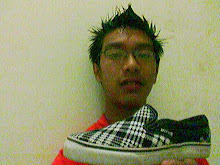WITH inhabitants totalling less than 400,000 people, bonded together by the national philosophy of the Melayu Islam Beraja (MIB), Brunei, the "Abode of Peace" is known to travellers and visitors alike as a safe place to be.
Living in such a close-knit society, where everyone practically knows or is related to one another, it seems only natural that one would place an amount of trust onto, in reality what could be, a near-perfect stranger. However, just how far can that trust go?
Speaking to The Brunei Times, 25-year-old Khaliq believes that Bruneians are more likely to trust each other since they live in a country with a relatively low crime rate, adding that Bruneians should consider themselves lucky and to be grateful that they have that privilege.
"If you were to go abroad, sometimes you would not have that luxury (the feeling of being safe)," said Khaliq, who frequently travels overseas for business trips.
"Walking down the street by yourself (at night), you'd have a tendency to stay wary, watching constantly behind your back... but you don't have to worry about that here (in Brunei)."
He explained that Bruneians enjoyed a sense of security and often give each other the benefit of the doubt, thinking that they would not be wronged by a fellow Bruneian.
"Lots of people, when they go to a (convenience) store to buy some groceries, they often leave their (car) engines running because they have fallen into the common perception that it's unlikely that your car will get stolen," he said.
A 57-year-old retiree who used to work in the construction sector said that the trust amongst Bruneians exists because of the culture which shapes each and every Bruneian to grow up abiding by a moral code and to live in unity and harmony.
The man, who wished to remain anonymous said that Bruneians grow up in a society where social gatherings, such as weddings, family dinners and prayers are common and is a major aspect of Bruneian culture.
He said these occasions brought together relatives where everybody gets to really know one another.
"You start talking to each other and next thing you know, you find out you are related. So, it is like you can trust the person next to you because (he or she) is maybe your relative or just a friend," he pointed out.
One 19-year-old student, Farah Mohammad has also grown accustomed to this way of life and usually would place some trust in a person that she just met.
"I think people in Brunei are more willing to trust someone and I think trust plays a big part of why Brunei is so peaceful," she said.
When asked hypothetically whether she would let someone, who said that they ran out of battery or credit on their phone, borrow her phone to make a phone call or text message, Farah replied that she would probably lend it to them, but she would first take a look at the person's body language to ensure that he or she was genuine in their claim.
However, Farah said that there was a limit to how much trust that most people would give others. She said simple things such as lending her phone to a stranger is an acceptable amount of trust.
"I would trust someone, but I wouldn't (fully) let my guard down, no matter how trustworthy they may appear to be," she said.
"Trust for someone you hardly know can only go so far."


















No comments:
Post a Comment